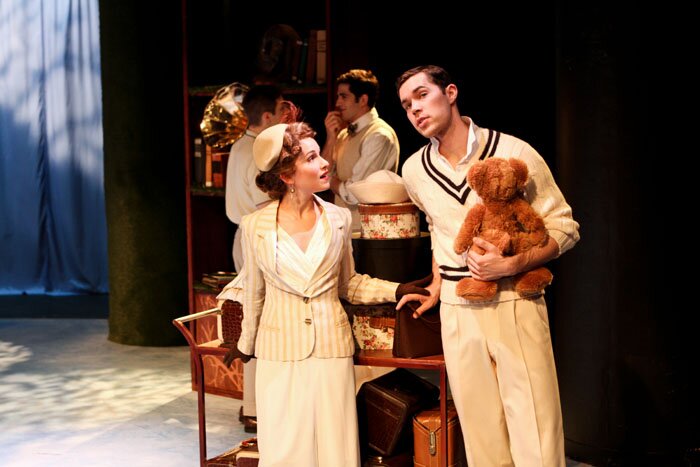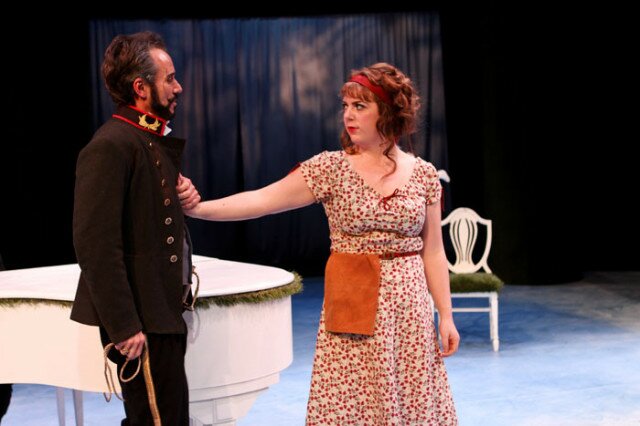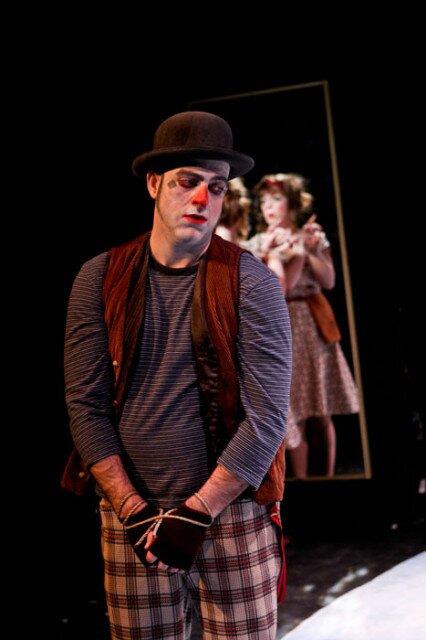Directed by noted Seattle actor Michael Place, Bengal Tiger at the Baghdad Zoo, by Rajiv Joseph at Washington Ensemble Theatre (through October 7; tickets), poses existential questions with a poetry and fluidity that makes it at once heartbreaking and brutal. Though these questions are handled with delicacy, the revelations are nothing new, so while I was not subjected to any ah-ha’s myself, the fact that a tiger is broken up over his place in the world after death did give me pause (paws?) and shed a small amount of light on dusty crevices of Nietzsche.
The play opens on two American soldiers guarding a Bengal tiger at the zoo in Baghdad, and the audience is thrown into the mundanity of war while the tiger (played by the beautifully skilled Mike Dooly) waxes poetic about being a tiger and the pangs of dealing with more obnoxious creatures like lions, or the politics of escaping the zoo into a city that is very much not a jungle.
The soldiers, a manic trying to impress everyone but showing his adeptness to no one, Kev (Ryan Higgins), and the much more hard-nosed seen-it-all, even though he’s barely twenty two, Tom (Jonathan Crimeni), quickly devolve into a predictably idiotic encounter with the tiger that ends with Tom losing a hand and the tiger dying a less than noble death inside his cage.
From there, we see a city not just burnt to nothing by war, but also endlessly haunted by the creatures harmed by it (animal and human), feeling the effects of constant, pointless firefights while never seeing the action on stage. No. The stage is used to question the endlessness of war and whether or not any God is watching or acting for its creations.
The play is lucky to have such skilled actors and such a skilled director. Higgins and Crimeni are tragically horrible, while still being likable. Mike Dooly, as the morose tiger, aches with the knowledge that God has abandoned the city and himself. And Erwin Galan as the interpreter, Musa, is lovely as a victim of two regimes, neither of which treated him well.
The set, designed by Tommer Peterson, is beautifully constructed and utilized expertly by Place, gradually peeling back layers of a crumbling city as the play moves forward and alliances shift.
All that aside, there’s one overly distracting element about Bengal Tiger that left me unsatisfied even after some truly amazing performances, and that’s the use of female characters, or lack thereof. Call me a bitchy woman if you must, but come on. The women (Keiko Green and Leah Pfenning) in this play have no substantial contribution beyond virgin/whore/caregiver/shrieking freak-out roles, barely holding two minutes of stage time when they are present. At best they are props, and at worst they are emotional strings that Joseph chose to pluck for no other reason than to get a reaction from a suggested brutal rape and murder scene. Great. Reducing female roles to these basic stereotypes is utterly lazy, boring, predictable, and demeaning. And frankly, I expect more from the writer of Gruesome Playground Injuries, which performed in that space not three months ago.
In 2013 I expect more. Let me re-phrase: I want to expect more, but the realist in me knows that it’s fruitless to hope that a play treating all its male/animal protagonists with depth and nuance would also do the same for the very sparse female roles. And while it didn’t ruin the otherwise breathtaking performances from the actors listed above, it did depress me that two potentially skilled actors wasted their time serving as props for the gain of male posturing. I’d almost rather they hadn’t been there at all than have them used in such a lazy way.







